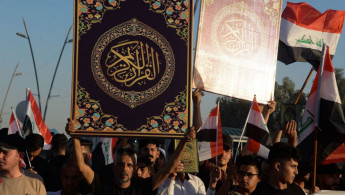Iraqis keep up Koran protests after book burnings
Iraqi security forces on Saturday dispersed about 1,000 supporters of Shia Muslim cleric Moqtada Sadr who tried to march to Baghdad's Green Zone housing foreign embassies, believing a Quran had been desecrated in Denmark.
The protesters were reacting to reports of an apparent desecration of the Muslim holy book for the third time within a month, with the first two in Sweden already raising diplomatic tensions.
On its Facebook page, the extreme right group Danske Patrioter posted on Friday a video of a man burning what seemed to be a Quranand trampling an Iraqi flag.
Copenhagen police deputy chief Trine Fisker told AFP that "not more than a handful" of protesters had gathered Friday across from the Iraqi embassy.
"I can also confirm there was a book burnt. We do not know which book it was," she said.
Hours later, the Danish Refugee Council office in Iraq's main southern city of Basra came under armed attack, its executive director for the Middle East, Lilu Thapa, said.
"Our staff on the premises at the time were physically unharmed, but there has been damage to the property with structures set on fire."
Sadr, who has a following of millions among the country's majority Shia population and wields great influence over national politics, has urged action after Quran desecrations in Sweden.
His followers gathered in the pre-dawn darkness in central Baghdad on Saturday, some carrying portraits of Sadr.
"Yes, yes to the Quran!" shouted the protesters, mostly young men.
Security forces blocked two bridges leading to the high-security Green Zone where governmental institutions and foreign embassies are located.
The demonstrators tried to force their way through but dispersed several hours later, following scuffles, an interior ministry official told AFP, speaking anonymously because he was not allowed to brief the media.
Another security source said officers used batons and tear gas to repel a small group of demonstrators who managed to break into the Green Zone in an attempt to reach the Danish embassy.
Hundreds of Sadr supporters were already behind the storming of Sweden's embassy in Baghdad early Thursday, over a planned burning by Iraqi refugee Salwan Momika of the Muslim holy book in Sweden, weeks after the same protester lit pages of the Quran.
'Words no longer enough'
Later on Saturday, several hundred supporters of another mainly Shiafaction, the pro-Iranian Hashed al-Shaabi (Popular Mobilisation) group, gathered on a central Baghdad street, brandishing copies of the Quran and Iraqi flags, an AFP correspondent reported.
Iraq's foreign ministry condemned "the desecration of the holy Quran and the Iraqi flag" in front of the embassy in Denmark.
Iraqi President Abdel Latif Rashid called on Western governments to put a stop to the "provocations".
Neighbouring Iran called in Danish ambassador Jasper Vahr to protest, the foreign ministry said.
"Book burning in Europe is a reminder of the dark atmosphere of the era of ignorance and the Middle Ages, which is the biggest threat to the freedom of thought in the West," its Western Europe director general Majid Nili Ahmadabadi said.
The Danish foreign ministry said it "condemns the burning of the Quran".
"Burning of holy texts and other religious symbols is a shameful act that disrespects the religion of others," it said in a statement.
The actions of Sweden-based Momika, whose book-burning protest had been permitted by Stockholm on free speech grounds, triggered condemnation across the Muslim world.
Sadr said in a vague tweet on Saturday that "words are no longer enough" in defending religion.
The chameleon-like figure, who has made several reversals of position over the years, had said in April that he was "freezing" his movement's activities for a year, though the decision would not affect religious activities.
Last August he said he was retiring from politics.
Hamzeh Hadad, a visiting fellow at the European Council on Foreign Relations think tank, said Sadr was indirectly challenging his rivals through the Swedish embassy attack.
"This both allows him to show he still possesses force and challenge his rivals' credibility among the international community," Hadad wrote on Twitter.
The cleric's supporters had rallied by their hundreds in Baghdad's Sadr City after Friday prayers, chanting support for the Quran. Protests also erupted in Iran and Lebanon.
Supreme leader Ayatollah Ali Khamenei called Momika's protest in Sweden "dangerous".
"The severest punishment for the perpetrator of this crime is what all Islamic scholars agree upon," Khamenei added, calling for Momika to stand trial in an Islamic country.





 Follow the Middle East's top stories in English at The New Arab on Google News
Follow the Middle East's top stories in English at The New Arab on Google News
![22 Arab countries at COP29 have rejected the targeting of fossil fuels [Getty]](/sites/default/files/styles/image_330x185/public/2024-11/GettyImages-2184289638.jpg?h=199d8c1f&itok=ptHl5bec)
![Dozens of people turned out for the funerals [Getty]](/sites/default/files/styles/image_330x185/public/2024-11/GettyImages-2185229760.jpg?h=e7c891e8&itok=1bctDcE6)
![The UAE is widely suspected of arming the RSF militia [Getty]](/sites/default/files/styles/image_330x185/public/2024-11/GettyImages-472529908.jpg?h=69f2b9d0&itok=Yauw3YTG)